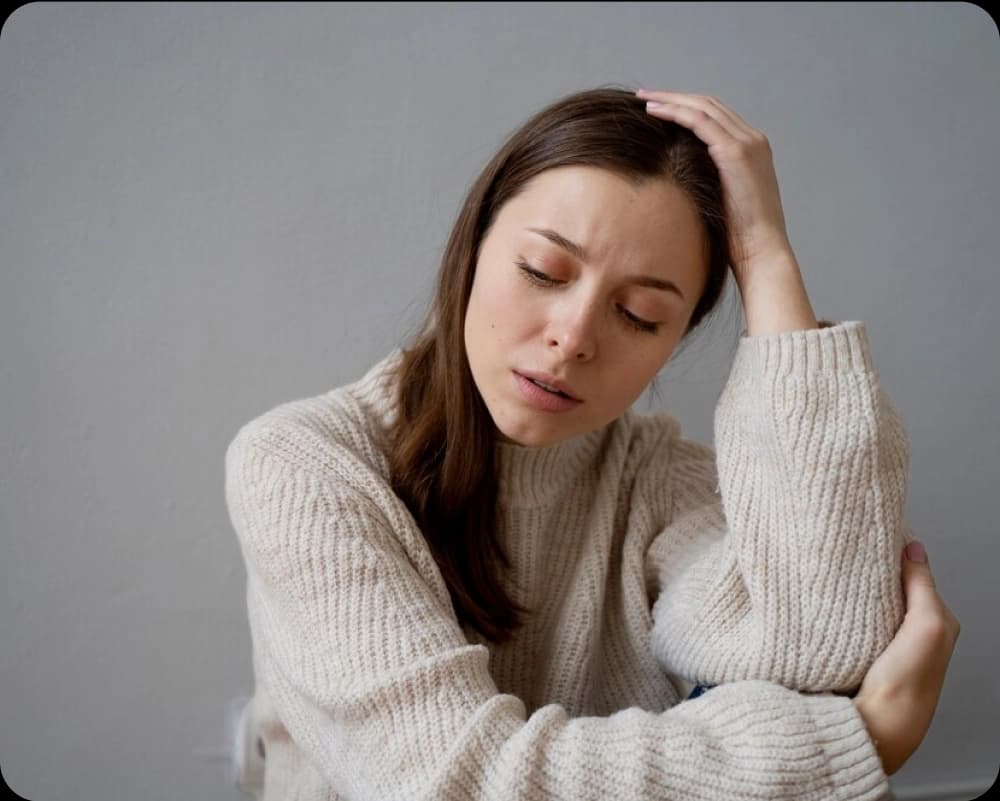Anxiety Disorders: Symptoms, Causes, and Treatment.

Seeking info about anxiety disorders?
Check out our comprehensive guide or reach out to us for more questions!

What Are Anxiety Disorders?
Anxiety is a natural human response when we perceive danger or a threat. It triggers our “fight-or-flight” reflex, releasing hormones that heighten our senses and prepare us to either confront or flee from the threat. This is normal when facing an immediate physical danger.
With anxiety disorders, however, this response is activated frequently and intensely, even when there is no real threat present. The mind perceives danger in everyday situations where most people would not. This causes excessive worrying, tension, fear, and physical symptoms that disrupt daily life.

Types of Anxiety Disorders
Several different types of anxiety disorders have their unique symptoms and challenges:
Generalized Anxiety Disorder (GAD), also known as affective disorders, involve persistent feelings of sadness or periods of feeling overly happy, euphoric, or irritated that impair regular functioning. Mental health is a chronic disorder characterized by exaggerated and persistent worry about everyday life. Data from the National Institute of Mental Health (NIMH) indicates that approximately 5.7% of Americans experience GAD, meaning this debilitating condition affects over 6 million people across the country.
Sufferers feel anxious nearly every day and have a hard time controlling the anxiety. This constant state of worry and apprehension disrupts daily functioning. Physical symptoms commonly include restlessness, fatigue, irritability, muscle tension, and sleep disturbances.
Read morePanic disorder causes repeated sudden surges of intense fear, terror, and panic. Attacks can cause heart palpitations, sweating, trembling, shortness of breath, feelings of losing control, choking, or having a heart attack. Symptoms peak within about 10 minutes and then subside. Those with panic disorder start avoiding situations where attacks could happen, which can severely restrict their lives.
Read moreContact us today! Take the first step to a wholesome you.
Also known as social phobia, social anxiety disorder (SAD) involves overwhelming worry about social settings and fear of being humiliated, judged, or rejected. It can cause avoidance of social situations such as public speaking, parties, interviews, dating, or using public restrooms. Blushing, trembling, and difficulty talking are common.
According to the Anxiety & Depression Association of America (ADAA), SAD is one of the most prevalent anxiety disorders. It affects men and women equally and often develops around age 13. Unfortunately, an ADAA survey found that 36% of people with SAD struggle with symptoms for 10 or more years before getting treatment.
Research also reveals considerable overlap between avoidant personality disorder (AVPD) and social SAD. Statistics show that 21% to 89% of individuals with AVPD also meet the criteria for SAD.
Read more
Reclaim Your Joy
Rediscover the joy and peace you deserve with our comprehensive mental health support. No matter the challenge you're dealing with, we are here to offer you the compassion and expertise you need to navigate your path to recovery.
Reach out to us today for a compassionate consultation, and take the first step towards reclaiming your happiness.

Common Symptoms of Anxiety Disorders
Since anxiety affects both the mind and body, symptoms can be both psychological and physical. Some common signs of anxiety disorders include:
Psychological Symptoms of Anxiety
- Chronic worrying or obsession over small concerns
- Feeling agitated and unable to relax
- Difficulty concentrating
- Irritability
- Irrational fears about specific situations or objects
- Feeling unmotivated, restless, and on edge
- Avoidance of situations that cause anxiety
- Distorted thinking and catastrophizing
- Difficulty making decisions
- Insomnia
- Intrusive thoughts or flashbacks of traumatic events
Physical Symptoms of Anxiety
- Nausea
- Dizziness
- Muscle tension
- Headaches
- Sweating
- Trembling or twitching
- Fatigue
- Rapid heart rate
- Chest pain or tightness
- Shortness of breath
- Tingling or numbness in the hands and feet
- Stomach pain or digestive issues
If you relate to several of these signs, you may have an anxiety disorder. The specific symptoms and their severity can vary greatly, but they all stem from that feeling of constant apprehension. Suffering from these unrelenting symptoms can start to feel “normal” after a while.Still, anxiety is not something you should keep tolerating. The proper treatment can provide relief.

Understanding Anxiety Disorders
Anxiety disorders are more than just feeling anxious once in a while. They are serious mental health conditions that can significantly impact an individual's life, relationships, work, and overall well-being.While it is normal for people to experience some level of anxiety in certain situations, such as before a job interview or when giving a presentation, individuals with anxiety disorders have persistent and excessive worry and fear that can be triggered by seemingly mundane situations. This can lead to avoidance behaviors, which further exacerbate the disorder.
Anxiety disorders are also associated with physical symptoms such as increased heart rate, sweating, trembling, and muscle tension. These physical symptoms can be distressing and may lead to individuals seeking medical help, thinking they have a physical health condition.
Anxiety can stem from traumatic events, genetic factors, brain chemistry imbalances, and thought patterns that exaggerate potential threats. According to statistics, approximately 6.2% of the American population - over 19 million people - are affected by some form of clinical anxiety.
If left untreated, anxiety disorders can negatively impact work performance, relationships, and overall health and well-being. The constant state of worry, panic, and feeling “on edge” takes a toll both mentally and physically. Additionally, many people turn to unhealthy coping mechanisms like drug or alcohol abuse to numb their anxiety when they feel unable to manage it in healthy ways.
At the Edge Treatment Center, we take a compassionate, comprehensive approach to evaluating and treating all forms of anxiety. Our goal is to provide lasting relief so you can function optimally and embrace life again.

Paint a Brighter Future
Your future is in your hands. Take the first step towards a fulfilling life now.

What Causes Anxiety Disorders?
Anxiety disorders stem from a complex combination of factors, including brain chemistry, childhood experiences, thought patterns, and traumatic events. Causes are unique for each individual. Potential contributing factors include:
Genetics
You have a higher risk if your parents or siblings have been diagnosed with anxiety disorders or other mental health conditions like depression.
Brain Chemistry
Those with anxiety often have an imbalance in certain neurotransmitters like serotonin, dopamine, and epinephrine. These brain chemicals regulate mood.
Trauma and Negative Experiences
Exposure to abuse, violence, tragedy, or significant losses during childhood often sets the stage for chronic anxiety later in life. High-stress events can alter the brain’s fear circuits.
Substance Abuse
Chronic use of stimulant drugs or other forms of substance abuse can trigger or worsen anxiety and panic attacks.
Medical Causes
Conditions like hyperthyroidism, mitral valve prolapse, hypoglycemia, and some deficiencies can mimic or worsen anxiety symptoms. Anxiety also co-occurs with many chronic illnesses.
Thought Patterns
Cognitive distortions like catastrophizing and overgeneralizing can fuel excessive worry and fears. People with anxiety tend to perceive more threats in everyday situations.
Trauma
Memories or sensory cues can trigger painful emotional flashbacks of traumatic events before conscious awareness of the memory occurs. This contributes to trauma disorders, panic attacks and hypervigilance.
Environmental Stress
Financial or relationship problems, high-pressure jobs, lack of work/life balance, and unhealthy family dynamics keep the body in a constant stress response. The specific causes are unique for each individual. Often, anxiety disorders result from a combination of biological and environmental influences. Our providers perform comprehensive evaluations to uncover all contributing factors to select the most effective treatment approach.
Personality
Shyness, introversion, high sensitivity, and neurotic personality traits may predispose people to anxiety disorders. But anyone can develop anxiety under chronically stressful conditions.

We’re Here To Help You Find Your Way
Let us lead you through a tailored treatment plan designed for your unique needs.

Overcoming Anxiety with Professional Help
The good news is anxiety disorders are among the most treatable mental health conditions. Many people with anxiety disorders can experience significant relief with professional treatment and support. Our team approach offers proven therapies and medication options to help you regain control of your emotions, thoughts, and daily functioning.
The treatment options for anxiety disorders include a combination of:
- Cognitive behavioral therapy (CBT) to change thinking patterns
- Exposure therapy to face fears in a safe setting
- Dialectical behavioral therapy (DBT) for stress tolerance
- Acceptance and commitment therapy (ACT)
- Eye movement desensitization and reprocessing (EMDR)
- Group therapy for social anxiety and support
- Relaxation techniques like mindfulness meditation
- Medications such as antidepressants and anti-anxiety meds
- Nutritional counseling
- Regular exercise regimen tailored to your needs
- Emotional support animal evaluation
- Family therapy and education
- Virtual reality exposure therapy
We individualize treatment based on the nature of your anxiety and integrate multiple modalities tailored to your needs. Most people respond best to a combination of psychotherapy, medication, lifestyle changes, and social support.Our caring team partners with you throughout your healing journey until you feel in control of anxiety’s influence over your life.



Anxiety Disorders Are Treatable. Reach Out Today to The Edge Treatment Center
Anxiety Disorders are Treatable. Reach Out Today to The Edge Treatment Center Left untreated, anxiety disorders can be harmful. Worse than just a case of jitters, anxiety disorders can cause lasting damage to your mental and physical health. That's why getting professional help is crucial.
The good news is that anxiety disorders are treatable. With the right support and treatment, you'll learn to manage your symptoms and lead fulfilling lives.
At The Edge Treatment Center, our team of highly trained professionals understands the complexities of anxiety disorders and offers comprehensive treatment options that address both the symptoms and underlying causes. Guided by a trauma-informed philosophy , we use evidence-based therapies such as cognitive-behavioral therapy (CBT), exposure therapy, and mindfulness-based approaches to help individuals manage their fears and worries.Don’t wait because anxiety tends to worsen over time without treatment. Contact The Edge Treatment Center today to learn more.

Find Your Happiness Again
You deserve to be happy and feel at peace. Mental health challenges can make it seem like happiness is out of reach, but we promise you, it's not. With the right support and understanding, you can overcome these challenges.
You don't have to face mental health challenges alone. Contact us today, and let's take the first step towards finding your happiness together.
FAQ
Frequently Asked Questions
A mental health professional from our facility will diagnose anxiety disorders based on a clinical evaluation, physical exam, psychiatric history, and description of symptoms. They may use criteria from The Diagnostic and Statistical Manual of Mental Disorders (DSM-5).
Our customized treatment plans, compassionate staff, state-of-the-art facilities, focus on long-term recovery, and family involvement during treatment set us apart. We are accredited and trusted leaders in anxiety treatment.
We accept most major insurance plans and will verify your coverage. We also work with many out-of-network plans and offer flexible payment options. Our staff will help you understand the costs.
We offer cognitive behavioral therapy (CBT), exposure therapy, mindfulness-based therapies, support groups, family therapy, and other proven treatments. Our therapists help clients develop effective coping strategies.
Please explore our website to learn about symptoms, causes, and treatment options. You can also call us directly to speak with a specialist about your specific needs and concerns regarding anxiety.
You should seek help if your anxiety is interfering with your daily life, relationships, work, or school. Getting early treatment can help prevent anxiety from worsening over time.